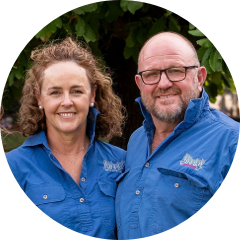Seasonal soil moisture and nitrogen availability
This project was completed in 2017.
Project Officer
Dr Cassandra Schefe
WHY THIS PROJECT WAS NEEDED
Connecting results from soil nitrogen sampling to soil moisture status can help grain growers predict if the stored nitrogen will be available to the crop through the year, or if it will be lost through leaching (due to accumulation of nitrogen at depth under high soil moisture conditions).
During June 2015, the North East Catchment Management Authority (NECMA) provided funds to Riverine Plains to install and monitor soil moisture probes in cropping paddocks at 11 sites across the Rutherglen region of Victoria through the Soil moisture probe network project.
The project aimed to help grain growers improve their knowledge of stored soil moisture, to inform their fertiliser application decisions. For example, if the soil profile has sufficient moisture, growers might decide to apply enough nitrogen (N) during spring to satisfy the full crop requirement. However, if there is limited stored soil moisture, growers might apply a smaller amount of fertiliser, as the crop would depend entirely on in-crop rainfall events to reach maturity.
Project focus
The project involved measurements of deep soil nitrogen (DSN) post-harvest and pre-sowing to account for nitrogen mineralised over summer. Additional funding from the Sustainable Agriculture Victoria: Fast-tracking Innovation Initiative, made possible with the support of the Foundation for Rural and Regional Renewal (FRRR) through the William Buckland Foundation, allowed DSN sampling (broken into incremental depth samples) at each of these sites.
The benchmarking of soil nutrient status in connection with soil water storage and soil type in cropping systems project was supported by NECMA through funding from the Australian Government’s National Landcare Program. This project commenced in 2016 and continued throughout 2017 to extend the work undertaken during 2015.
Several soil moisture probes from the original Soil moisture probe network project were relocated into the Boorhaman area through a partnership with the Boorhaman Landcare Group. Soil moisture monitoring and DSN sampling continued until pre-sowing 2017, with a full soil chemistry analysis undertaken at each site during June 2017 to assist in developing a network of benchmark sites through the region.
Project outcomes
Key messages from the project trials were that:
- Soils in the Rutherglen region of Victoria are highly variable.
- While most soils across the region increase in clay content in the subsoil, there is a vein of sandy subsoil that runs through the Boorhaman region.
- While soil moisture probes are a valuable management tool, accurate interpretation requires an understanding of the soil type, including any physical and chemical constraints that may restrict root and/or water movement to depth.
- Sampling for deep soil nitrogen (DSN) by combining all soil from 0-60cm depth does not give a clear picture of where nitrogen is located in the profile, and how readily plants can access it.
Full results were published in Research for the Riverine Plains, available at 2018 Seasonal soil moisture and nitrogen availability and 2016 Seasonal soil moisture and nitrogen availability.
Find out more
For further information. please email Riverine Plains Senior Project Officer Jane McInnes at jane@riverineplains.org.au.
Project investment
MORE ON Soils & Grains
Our research enhances food production, increases environmental resilience and improves community connection across the Riverine Plains. See how our research creates impact.
-
Grains
Business
-
Grains
Sustainability
-
Grains
-
Grains
-
Soils
Grains
-
Soils
Sustainability
-
Grains
Soils
-
Drought
Grains
-
Soils
Grains
-
Grains
-
Grains
Soils
-
Soils
Grains
-
Fodder
Grains
-
Grains
-
Soils
Sustainability
-
Grains
-
Soils
Sustainability
-
Grains
Soils
-
Sustainability
Grains
-
Grains
Sustainability
-
Soils
Climate
-
Grains
Sustainability
-
Soils
Climate
-
Livestock
Grains
-
Grains
Soils
JOIN RIVERINE PLAINS
Riverine Plains provides opportunities to see new research and innovation, connect with rural communities, and attend informative events.


